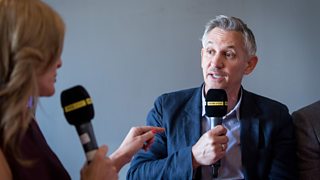World Cup tongue-twisters: how to pronounce players' names
Martha Figueroa-Clark
主播大秀 Pronunciation Unit Manager

The World Cup is here, and excitement will soon be reaching fever pitch. Thirty two nations are competing, from the hosts Russia to Saudi Arabia, Nigeria, South Korea, Iran, Peru and - who can forget that booming handclap that took the world by storm at Euro 2016 - Iceland!
Amid all the excitement, you might spare a thought for all the football commentators and sports journalists who have to get their heads around some pretty tricky footballer names – and lots of them. But just how do 主播大秀 broadcasters know how to pronounce them?
Back at 主播大秀 HQ, there is a small team of three linguists who make up the 主播大秀 Pronunciation Unit. We are all phoneticians who speak a number of languages besides English and we provide an advisory service for 主播大秀 broadcasters - it is our job to research pronunciations and provide guidance.
All of our advice is anglicised so that it is pronounceable by broadcasters and intelligible to audiences. We use a phonetic system called to render pronunciations in writing, and in all cases, stressed syllables are shown in upper case.
In general, our policy is that where an established anglicisation exists, that is what we recommend. In cases like Paris, where the English and French forms are spelt identically, broadcasters are advised to use the established anglicised form: PARR-iss not parr-EE.
In cases where there is an established English place name, such as Moscow, pronounced MOSS-koh in British English, we advise broadcasters to adopt the English form of the name rather than the Russian form Moskva.
In the case of little-known place names, we recommend a pronunciation which is as close to native pronunciation as possible, but in keeping with the sounds of English.
One of the place names already getting a lot of attention is England’s base near St Petersburg called Repino, named after the Russian painter, Ilya Repin. The place name should be pronounced with stress on the first syllable: RAY-pin-oh (-ay as in day, note first syllable stress), although the pronunciations REP-in-oh and REP-in-uh (-e as in get, -uh as ‘o’ in cannon) are also possible anglicisations.
The Moscow stadium where the opening game takes place is Luzhniki, pronounced with stress on the final syllable: loozh-nik-EE (-zh as 's' in measure, note final syllable stress).
Nizhny Novgorod is often anglicised as NIZH-ni NOV-guh-rodd (-1st -i as in bit, -zh as ‘s’ in measure, -2nd -i as ‘y’ in happy, -o as in not, note first syllable stress) though the Russian pronunciation is closer to NEEZH-ni NOV-guh-ruht (-ee as in street, -zh as 's' in measure, -t as in top).
One of the host cities Kaliningrad is usually pronounced kuh-LEE-nin-grad (-uh as ‘a’ in sofa, -ee as in street, note second syllable stress) in English; the Russian pronunciation is closer to kal-in-een-GRAT (note final syllable stress).
What about some of the footballer names?
One of the stars of the Russia squad is goalkeeper Igor Akinfeev, pronounced: EE-gor ak-in-FYAY-yuhf (-ee as in street, -g as in get, -fy as in few, -ay as in day, -y as in yes, -uh as in oven, -f as in fit, note stress).
Another player to watch is Alan Dzagoev, pronounced al-AN dzag-OY-yuhf (-dz as in bids, -oy as in boy, -y as in yes, -f as in fit, note final syllable stress in first name – unlike the English pronunciation of ‘Alan’).
To conclude, here’s a selection of player names from other teams in Group G:
Tunisia: England’s first match will be against Tunisia so look out for French-born midfielder Saif-Eddine Khaoui, pronounced SAYF uh-DEEN KHAA-wi (-ay as in day, -uh as in oven, -kh as in Scottish loch, -aa as in father, -i as ‘y’ in happy), although the French pronunciation is closer to kaa-WEE (-k as in king).
Belgium: Kevin de Bruyne – the anglicised pronunciation of his name is duh BROY-nuh (-oy as in boy, -uh as 'e' in oven) but the player himself uses the pronunciation duh BROE-nuh (-oe as in French coeur) in Flemish and English, which may be further anglicised as duh BRUR-nuh (-ur as in fur but 'r' is not pronounced). The pronunciation duh BROW-nuh (-ow as in now) is debatably closer to the Standard Dutch rather than Flemish pronunciation.
Panama: defender Luis Ovalle, pronounced luu-EESS oh-VIGH-yay (-uu as in book, -ee as in street, -ss as in less, -oh as in high, -igh as in high, -y as in yes), and midfielder Aníbal Godoy, pronounced an-EE-bal god-OY (-o as in not, -oy as in boy, note stress in each name).
